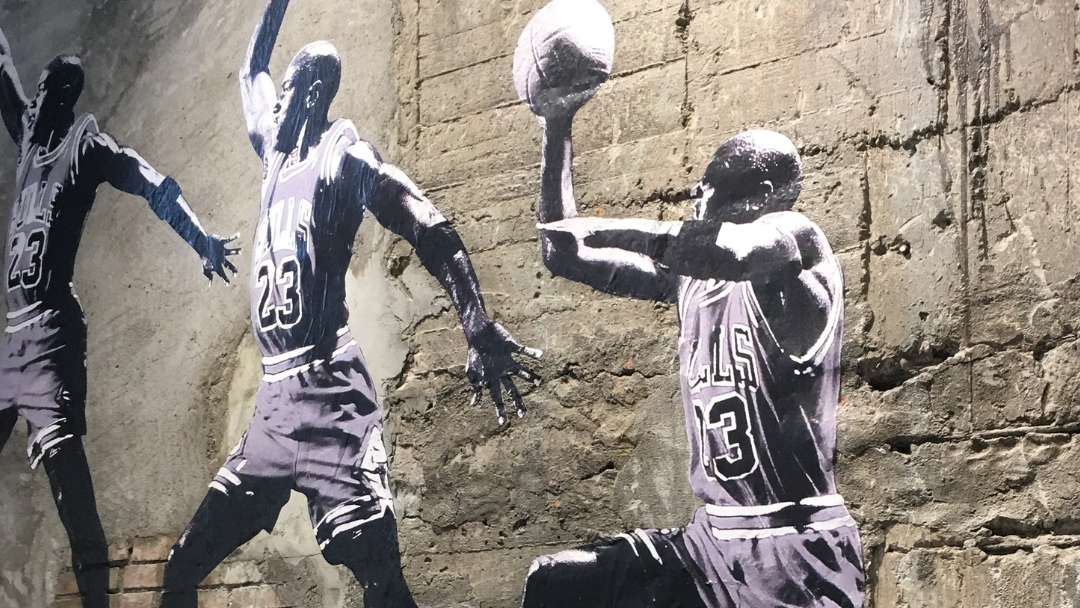Any sport—yes, any of them—can be reduced to an absurdity, given even a moment’s thought.
Keeping a ball above the ground, putting it in a certain place by a certain time, getting your own body somewhere before the ball does; all of it is a complete waste of time.
Throw in historical context and it becomes even less rational, less natural, to be doing these things. American football wasn’t even invented until the late 19th century; basketball was even later. They don’t have the historical, humanistic roots of, say, soccer, or tennis. They don’t have the utility, the ease of access, that sports like track and field enjoy.
And where, by the way, are any of these skills applicable, you know, in the real world? Why are we doing them, and why does anyone care? At best, they are thin frameworks, boundaries within which we assess human physical ability; at worst, they’re the relic of a militaristic, nationalistic society. Why all the money, the attention, the effort?
Basketball was what brought me to this line of thinking, back in middle school, in one of those epiphanies that are usually reserved for marijuana-influenced teens. “It’s just throwing a ball in a hoop? How dumb,” I’d think. Like a carnival game, or one you might play on TV as a guest on a children’s show starring a clown. How being good at this absurd thing could get anyone status in the world—and later, how they could get free rides to schools I would have to apply for based on academic merit—was beyond me.
But I’ve never questioned Michael.
Michael Jordan, in flight, tongue hanging out and eyes wide open like a rabid dog, one arm extended overhead, a basketball effortlessly gripped in one hand, as defensive players faded uselessly out of frame. He rises, suspended in space like a hummingbird, outside the realm of human capability.
There was a time, at least in Chicago, when Michael was everywhere. He led the Bulls to three championships from 1991 to 1993, in a series that I’m too young to remember, before quitting the sport to pursue a career in baseball. I don’t remember that, either. But I remember the second, and more important, three-peat, the one preceded by his two-word press announcement (“I’m back”), the one that, to me at least, made him a superstar. In 1996, he became the NBA MVP once again when he led the team to a 4-2 series win against the Orlando Magic. The next year, they did the same against the Utah Jazz. This series is known for Michael’s at-the-buzzer final shot, followed by a fist pump, and The Flu Game, in which he played through a bout of what was likely food poisoning. In 1998, The Bulls bested the Jazz once again, in a series that took on new significance as it would likely be Michael’s last. They beat the Jazz 4-2 again, thanks to Michael’s twenty-foot shot that clinched it for the Bulls.
I remember loving Michael just like everyone else at this time, with the devotion one usually reserves for religious figures. During these games, instead of sitting on the couch with my dad and his friends, I’d yo-yo behind them, superstitiously believing that my success at my tricks would help Michael. Dad and I would refer to The Bulls as the Good Guys, and the other team as the Bad Guys. Then, after every postseason game, I’d cut all of the articles about the Bulls out of The Chicago Tribune and carefully place them in a scrapbook. Awkward even at eight years old, mostly friendless, and confused about most things, Michael made sense to a young me. I watched every game with awe, ethe fictional ones depicted in the 1995 film Space Jam, and became convinced that basketball skills were important—essential, even—that what these men did was akin to godliness.
Of course, it didn’t hurt that Michael was heavily marketed to elicit exactly that reaction. During the playoffs, it seemed that he was the feature of every ad. Over the course of his career Michael had business deals with Hanes, McDonald’s, Chevrolet, Wheaties, Nike of course … the list goes on. I envied the girls who showed up at school wearing a Jordan jersey over a white Fruit of the Loom T-shirt. I wanted one, so badly. I wanted anything that had a Michael in midair silhouette painted on it. And I wanted, as a Gatorade ad suggested, to Be Like Mike.
I did play basketball around this time, with the neighborhood boys; they had one of those hoops with the sloped base so that the ball would come rolling back if you shot it just right. I wasn’t very good.
I also had the great privilege of witnessing Michael’s prowess in person when my dad took me to not one, but two Bulls games, in 1996, when the team was at their peak. They lost both games, but, and this was before we realized I was nearsighted, if I squinted, I could see him—I could see him!—from our cheap seats up in the nosebleed section.
Now, when I return to the United Center, as I did for the All-Star Weekend in February 2020, I make sure to stop at the bronze statue that attempts—with great success, I think—to capture Michael’s magic, depicting him in mid-dunk. “The best there ever was,” the inscription reads. “The best there ever will be.” The sculpture, while including his entire body, is only attached to the pedestal by his knee, giving it the illusion of flight. Some say the sculpture was based on his performance at the 1988 Slam Dunk Contest, where he dunked from the free throw line—from a distance of fifteen feet, up to a height of 10 feet. When you see this sculpture, you’re seeing what should have been something that ended in an embarrassing splat on the hardwood floor and a trip to the emergency room. Instead, we see a feat of athleticism that rivals the top jumpers in any sport.
Michael hasn’t always been easy to love. I stopped playing basketball with the boys around age eight after realizing that following gender norms was probably the safest option for me, and I stopped following the Bulls (along with most everyone else) after the best players of the 90s departed. Soon, I would get to the point where in PE class my teacher would correct my layup form and I would think so loudly I’m sure he heard, “Why? Who gives a shit?” I would roll my eyes at the boys who simply refused to just pass the ball without doing a ball-handling trick first. I saw that Hitler mustache, and heard about the gambling issues. I saw the stiff drink he kept next to him as he gaslit Scottie Pippen about his postseason migraine in the most recent documentary about his time with the Bulls.
And Michael, of course, didn’t attend that All-Star Game. Though the game was held in Chicago, the city where Michael became famous, and though he was in town that weekend, on game day, he was nowhere to be found. It was rumored that his birthday party was being held that week, that the guest list was super exclusive, and that guests wouldn’t even know the location until moments before it began. At the All-Star game, Pippen showed up to represent that great time in Chicago sporting history, to thunderous applause. But no Michael.
That’s possibly because of an attribute of his personality that he shares with many of the greatest athletes of our generation: Michael Jordan appears to be an asshole. In the same documentary, he mocks women’s sports and expects others to accommodate a large ego. He knows that he’s great, and he expects to win.
To be fair, I don’t know if it’s possible to be as great as he was without being a dick. And far from being a reason to hate my dear Michael, I find this refreshing. How often does someone with such power show you exactly who they are, before you even meet them? This way, he can never disappoint me.
As for the NBA All-Star Game slight, I forgave Michael immediately. He’s already done so much for the city, I thought. At a time in the 90s when I suppose some vaguely bad things were happening in the world and things were vaguely insecure at home, he gave us Chicagoans hope. He gave us something to do. He gave us a reason to turn on the TV and look at it in groups. He’s the reason I got to stop at the grocery store on the way home from the United Center and eat a whole sleeve of Reese’s with my dad, in what to this day remains a top ten childhood memory.
Plus, while I know this could be a result of careful imprinting, I simply can’t resist seeing Michael as something magical, otherworldly, to this day. The ball was passed to him, we held our breath. He made us wait until the last second, and he jumped. He emitted confidence off his body like heat from his skin. Hundreds of cameras flashed at once to capture him at his zenith. He froze time. He made you stand up without realizing it. He made you have faith in someone, that if only they would give the ball to Michael, it would work out. Everything would make sense; the good guys would win, because we have Michael. Then he made you cry out.
Some of our best literature relies on the absurd. In Catch-22, one character keeps crabapples in his mouth for no reason, and it’s never explained. In The Metamorphosis, we never find out why the main character suddenly becomes an insect. In Waiting for Godot, the two main characters wait, and wait, for something that will never come. I can pinpoint the exact moment when, far from the apple-cheeked little girl that yo-yo’d to help Michael, hardened and worn from a cruel world and divorced from the absolutism that once made it make sense, I stopped believing in God. Why should I? Why bother?
In the story of my life, Michael comes along. He jumps over a defender and, impossibly, switches the ball from one hand to another in midair. With his tongue way out, he thinks, so loud that you can hear it from way up in the United Center’s nosebleeds: Here’s why.
JESSICA TAYLOR PRICE is a freelance writer originally from Chicago, IL. Her work has appeared in Bleacher Report, Teen Vogue, and ESPNW. Jess lives in Durham, UK with her husband.
Like what you’re reading?
Get new stories, sports musings, or book reviews sent to your inbox. Drop your email below to start >>>
NEW book release
Ghosts Caught on Film by Barrett Bowlin. Order the book of which Dan Chaon says “is a thrilling first collection that marks a beginning for a major talent.”
GET THE BOOK



